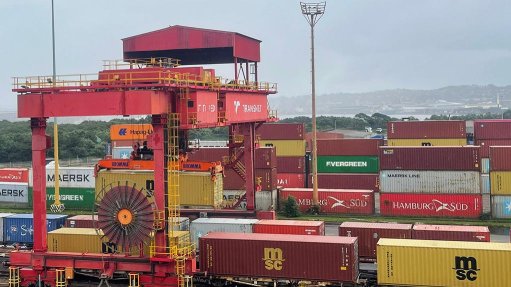African Presidents highlight importance of hydrocarbons as well as renewables for continent
Addressing the Africa Energy Week conference in Cape Town on Tuesday, by means of a pre-recorded video message, Ugandan President Yoweri Museveni expressed pleasure that African countries were now working together on energy. African energy producers had to take advantage of African markets.
“Energy is a necessity for the development of any society,” he pointed out. As Africa was the least developed continent it needed energy more than any other continent. And, so far, Africa had been the most responsible continent regarding carbon emissions. The continent should be applauded for this, he suggested.
The main energy challenge facing Africa was access to reliable, sustainable, modern energy. A just transition to low-carbon-emitting energy required that the continent’s development needs not be compromised. It was only fair that all Africa’s energy sources played a role in developing the continent.
He criticised European politicians who opposed the Uganda-Tanzania oil pipeline project (which would convey Ugandan petroleum to the Tanzanian coast). He characterised them as “arrogant actors” and affirmed that Uganda was happy that its oil and gas projects would produce the lowest possible carbon emissions. He also pointed out that, even when no longer needed as a fuel, petroleum would still be required to make other products, such as textiles and plastics.
He also noted that Uganda already used renewable energy sources, including hydropower, solar power and biomass. The country would increase its use of renewables.
Mozambican President Felipe Nyusi likewise addressed the conference on Tuesday through a pre-recorded video message. He highlighted that 600-million Africans, or about 48% of the continent’s population, still had no access to modern energy.
He affirmed that fossil fuels could play a role in the development of the continent. Although countering climate change required that carbon emissions be reduced, African countries with hydrocarbon resources, such as Mozambique, had to exploit them urgently. Carbon neutrality had to be achieved (under international agreement) by 2050. But this could be done if the process was fair and, in Africa, applied gradually.
Natural gas now provided about 33% of Mozambique’s power. The country was also a major producer of hydropower and was developing significant new hydropower plants. Mozambique had a national objective of achieving universal access to modern energy by 2030. The country also exported energy to South Africa, Zimbabwe, Malawi and a connection to Zambia was being constructed.
“This is the time to move from speeches and conferences and really have an action plan for Africa,” urged Organisation of Petroleum Exporting Countries (OPEC) president and Republic of Congo Hydrocarbons Minister Bruno Itoua, addressing the conference on Tuesday, in person. “And for an energy action plan. … This is the time to have an African voice. Only one voice. A unique voice.”
It didn’t make sense that Africa had such large oil and gas reserves, and exported oil and gas, yet 600-million Africans were without electricity and 900-million Africans had no access to modern gas (for cooking), he affirmed. But Africa was making progress, as shown by the many government officials and business people attending the conference.
Referring to OPEC’s recent decision to cut production, he defended this as a ‘scientific-technical’ decision to stabilise the market. He noted, that in his press conference at that time, he had said that Africa fully supported OPEC’s decision.
Article Enquiry
Email Article
Save Article
Feedback
To advertise email advertising@creamermedia.co.za or click here
Press Office
Announcements
What's On
Subscribe to improve your user experience...
Option 1 (equivalent of R125 a month):
Receive a weekly copy of Creamer Media's Engineering News & Mining Weekly magazine
(print copy for those in South Africa and e-magazine for those outside of South Africa)
Receive daily email newsletters
Access to full search results
Access archive of magazine back copies
Access to Projects in Progress
Access to ONE Research Report of your choice in PDF format
Option 2 (equivalent of R375 a month):
All benefits from Option 1
PLUS
Access to Creamer Media's Research Channel Africa for ALL Research Reports, in PDF format, on various industrial and mining sectors
including Electricity; Water; Energy Transition; Hydrogen; Roads, Rail and Ports; Coal; Gold; Platinum; Battery Metals; etc.
Already a subscriber?
Forgotten your password?
Receive weekly copy of Creamer Media's Engineering News & Mining Weekly magazine (print copy for those in South Africa and e-magazine for those outside of South Africa)
➕
Recieve daily email newsletters
➕
Access to full search results
➕
Access archive of magazine back copies
➕
Access to Projects in Progress
➕
Access to ONE Research Report of your choice in PDF format
RESEARCH CHANNEL AFRICA
R4500 (equivalent of R375 a month)
SUBSCRIBEAll benefits from Option 1
➕
Access to Creamer Media's Research Channel Africa for ALL Research Reports on various industrial and mining sectors, in PDF format, including on:
Electricity
➕
Water
➕
Energy Transition
➕
Hydrogen
➕
Roads, Rail and Ports
➕
Coal
➕
Gold
➕
Platinum
➕
Battery Metals
➕
etc.
Receive all benefits from Option 1 or Option 2 delivered to numerous people at your company
➕
Multiple User names and Passwords for simultaneous log-ins
➕
Intranet integration access to all in your organisation

















